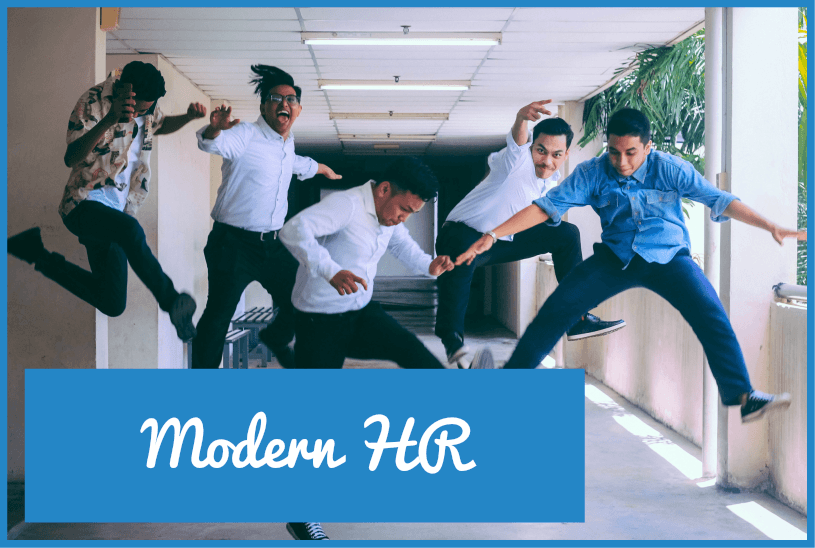
Modern HR
The role of human resources is evolving, and industry now demands far more from the people function than ever before.
The most significant trends in Modern HR over the last decade were:
- A more competitive global business landscape
- The impact of information and communications technologies
- A more complex legal environment, laws influencing employee rights
- The aging workforce and the retirement of the Boomers generation
- Problems finding skilled workers
- Economic uncertainty and volatility
- Greater demand for work/life balance
Twenty-first century HR leaders are now pushed to have a deeper, more applicable understanding of business so policies have a defined and valid return on investment, as the thin line between profits and people becomes more blurred.
Acquisitions, new product launches, and new markets and geographies all create an exciting yet challenging environment for HR. Organizations are constantly evolving as they drive for innovation and growth. To refocus HR in a new era of growth around employee experience, we need to move beyond transactions to address business needs.
These needs include a talent-centric view of the workforce, tools and policies that encourage collaboration, applications that are engaging and mobile, and the insights that enable management to predict the business impact of modern HR efforts.
Social apps and collaboration technology have forever changed the way we live and work.
When applied to the workplace, these same social technologies can improve communication and increase productivity.
More jobs are bigger than can be done by one person. Collaboration enables a network effect that makes a much bigger contribution to the enterprise. HR leaders who foster true collaboration will boost enterprise performance.
Employees have unprecedented speed and access to anything and anyone from anywhere. This is dramatically shifting employee expectations, and continues to do so as new innovations continue to be absorbed into the mobile landscape.
In addition to social networks, predictive ranking tools help HR automate job board processes, while databases of suitable candidates allow companies to manage their own relationship with candidates.
These smart sourcing strategies will allow you to recruit from a bigger pool of qualified candidates, build stronger relationships with job seekers, and earn a higher return on any talent sourcing investments.
HR needs a performance management model that recognises this shift and evaluates performance based on actual measures of work tied to business outcomes.
When employee and line manager behaviour are linked to result that matter not only to the organization, but also to customers and business partners, then HR becomes the driving force for business success.
Organisations are expanding operationally into some new geographies and moving talent across the globe, in order to fill regional talent needs.
An effective, global HR technology foundation can support this imperative to globalize while helping to control HR’s operational costs and cater to local needs.
A dedicated analytics team can combine workforce and talent data with business and financial data to ground decisions in facts and provide better visibility into business performance.
With the right HR Leader, as HR entrepreneur, change office and analytics guru and a database populated with HR and human-generated information, HR leaders will be prepared to turn HR into a strategic business function that drives growth instead of hindering it.
In a marketplace where employees have so many options to advance their careers, you will have to fight to keep and get the best people working for you.
Social listening, using communities to on-board new hires, better tools for collaboration and mobile work, customised compensation/benefit packages, and flexible work styles are some of the things we will discuss.
Changes For You As HR Leader
You are no longer the organization’s HR professional!
You’re the new HR change officer who doesn’t create a workforce that merely executes strategy but rather moves with strategy. As chief change officer, you must partner with the CEO and your C-suite peers on change decisions and prioritize building a change-capable workforce and HR function.
These are big and important shifts, and if we only focus on improving the effectiveness of individual change initiatives, we won’t realize them.
To increase your probability of change success, focus on preparing the organization to better manage any change that comes its way. And this doesn’t require investing tons of resources in change management but rather building the organization’s change capability.
Sure, change is constant and difficult. But you now have the responsibility and resources to make changes succeed. And that is the CHRO’s best opportunity to win friends and influence people—to demonstrate true enterprise leadership.
Workforces often cannot adjust to change, making long-term engagement and performance declines common. How can heads of HR create a workforce that consistently performs well during change and vastly improves the probability of change success?
Most companies try to create an agile workforce that embraces or likes change (i.e., change responsive); the best HR functions build a workforce that is capable of adjusting its work to change (i.e., change capable).
Organisations that complement such structure, are made up of well-integrated operational and business processes, with communities of practices, innovation ecosystems and discussion groups arising from social technologies spreading out into all areas of the company. Such organizations will succeed in forming collaborative working environments where it makes sense to work, learn and develop professionally.
The organization that learns from the environment leads transformations which energize markets and surprises employees. Likewise, it expands access to experiences, practices and knowledge outside the physical boundaries of the company, through intensive and extensive use of social technologies and next-generation collaboration.
The future of teams is mixed, and, as in any shifting point or paradigm change, some teams will stay the same while others evolve into new structures that can tackle the more complex problems of today with greater expertise, in a much shorter time, and with a greater level of success 😉
© New To HR



Mark Jcobs
12/01/2019 at 11:24The current scenario of HR has already started adopting the new technology in the industry. The future will be much more dependent on technology for sure. AI and machine learning are yet to be explored in this area.